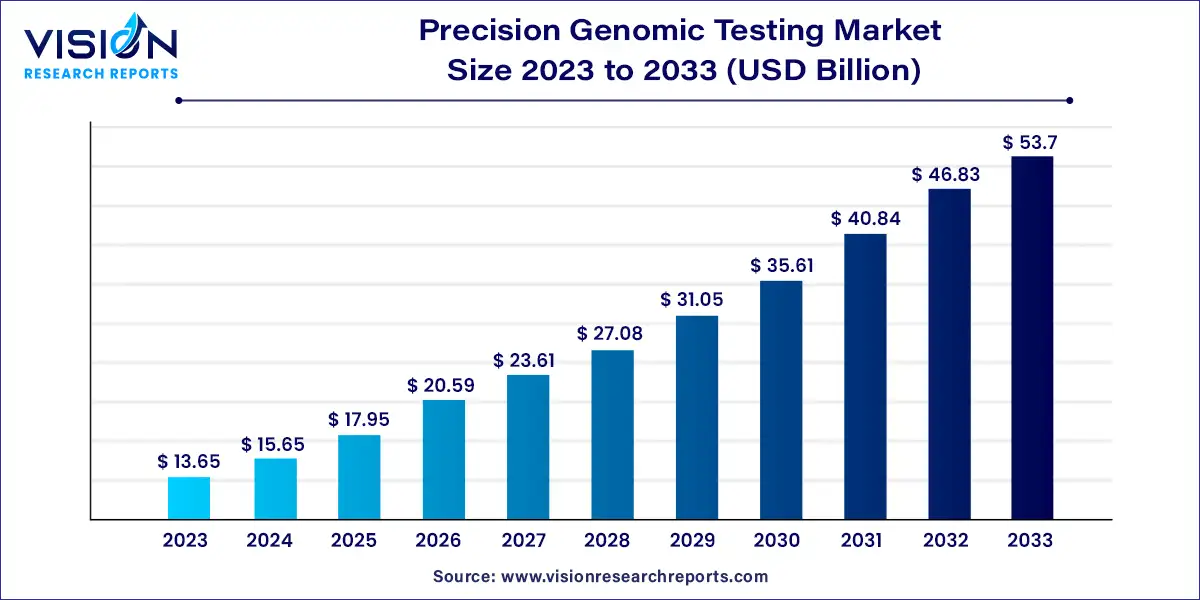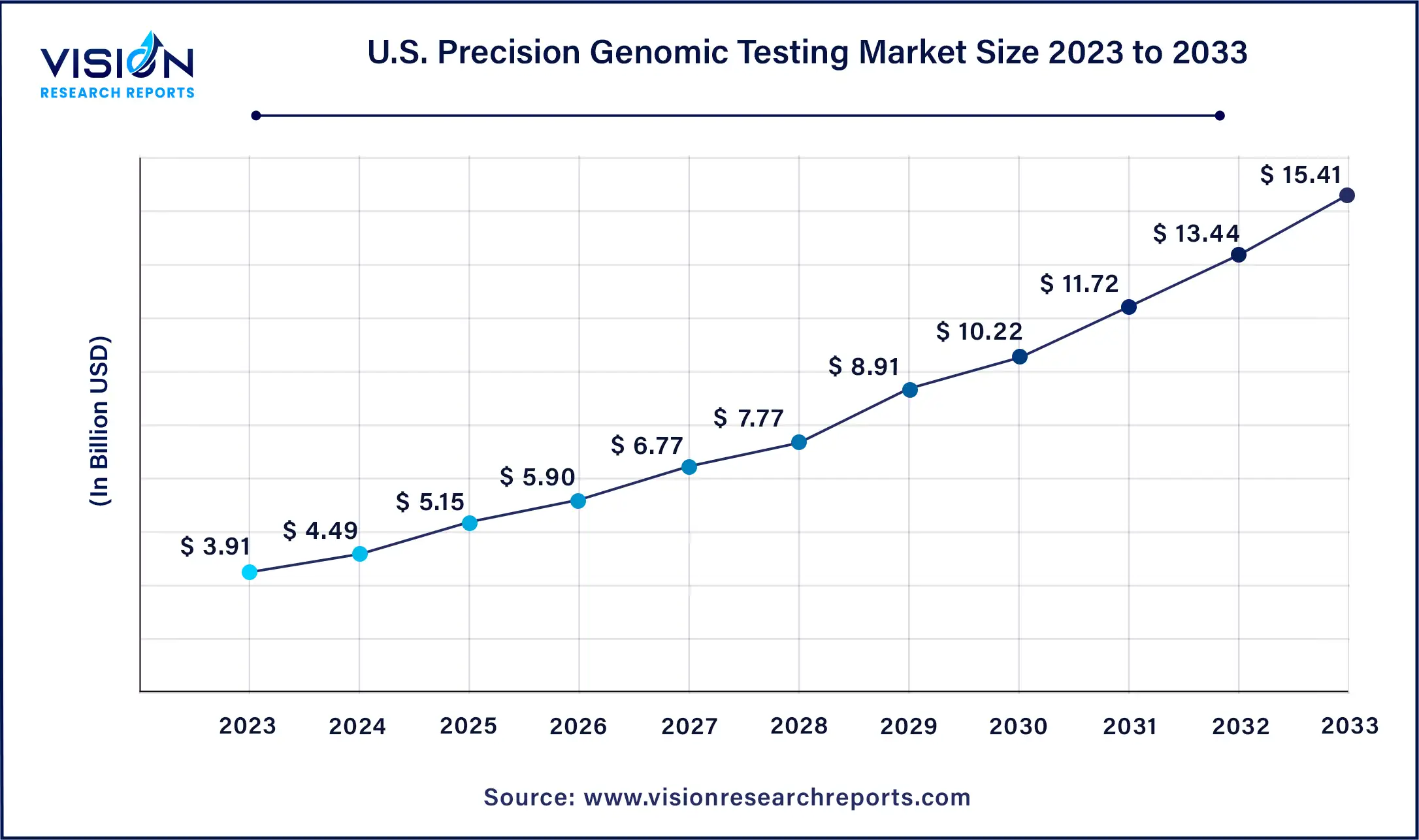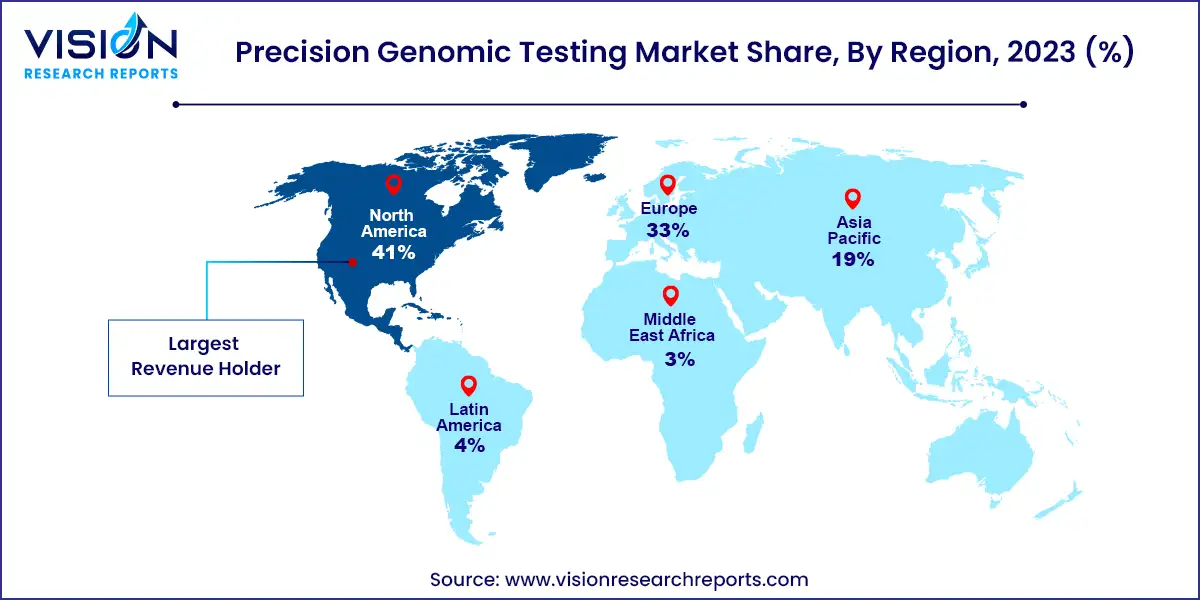The global precision genomic testing market size was valued at USD 13.65 billion in 2023 and is anticipated to reach around USD 53.7 billion by 2033, growing at a CAGR of 14.68% from 2024 to 2033. Precision genomic testing represents a transformative shift in the healthcare landscape, driven by advances in genomics and personalized medicine.

The precision genomic testing market is experiencing robust growth due the technological advancements, such as the development of next-generation sequencing (NGS) and high-throughput genomic platforms, are enhancing the accuracy and efficiency of genomic testing. These innovations enable more detailed and reliable genetic analysis, driving demand for precision diagnostics. Additionally, the increasing prevalence of genetic disorders and chronic diseases has heightened the need for precise and personalized medical interventions, further fueling market growth. Rising healthcare expenditures, particularly in developed economies, support the adoption of advanced genomic technologies, while expanding genomic databases contribute valuable insights into genetic variations and their health implications.
In 2023, the North American precision genomic testing market dominated globally with a 41% share, led by key players like Illumina, Thermo Fisher Scientific, and QIAGEN. Innovations in NGS technologies and bioinformatics are driving market growth, enabling improved genomic analysis and personalized medicine applications. For instance, in June 2022, Labcorp recognized the growing significance of precision medicine and committed to expanding access to targeted and personalized treatments. These advancements support North America's leadership in genomic research and clinical applications, fostering collaborations between academic institutions, healthcare providers, and biotechnology firms.
| Attribute | North America |
| Market Value | USD 5.59 Billion |
| Growth Rate | 14.68% CAGR |
| Projected Value | USD 22.01 Billion |
The U.S. precision genomic testing market size was estimated at around USD 3.91 billion in 2023 and it is projected to hit around USD 15.41 billion by 2033, growing at a CAGR of 14.68% from 2024 to 2033.

The U.S. precision genomic testing market is set to grow over the forecast period, driven by increased collaborations between industry leaders and research institutions. For example, in May 2023, Pfizer and Thermo Fisher Scientific Inc. announced a partnership to expand the local availability of NGS-based testing for lung and breast cancer patients. Such collaborations stimulate innovation and expedite the development of advanced genomic technologies, enhancing diagnostic capabilities and personalized treatment options.
Europe Precision Genomic Testing Market Trends
The precision genomic testing market in Europe is expected to grow, supported by substantial investments in research and development. Increased funding is promoting advancements in genomic technologies and fostering innovation in diagnostics and personalized medicine across the continent.
In the UK, the market is projected to expand due to technological advancements. For instance, in June 2024, The Royal Marsden NHS Foundation Trust and Automata Technologies introduced robotic technology to aid genomic testing for cancer patients. This collaboration utilizes NGS and CRISPR gene editing technologies to enhance the accuracy and efficiency of genetic analysis for personalized medicine applications.
In Germany, the market is expected to grow due to advancements in genomic sequencing technologies. For example, in April 2023, CENTOGENE launched CentoGenome, a new whole genome sequencing solution designed to diagnose rare and neurodegenerative diseases. This innovative tool provides healthcare professionals with extensive diagnostic information, potentially speeding up access to treatment options.

Asia Pacific Precision Genomic Testing Market Trends
The precision genomic testing market in Asia Pacific is anticipated to grow rapidly, with a projected CAGR of 19.82% from 2024 to 2033, driven by significant investments in research and development. These investments are fostering technological innovations in genomic sequencing and diagnostics, enhancing the region's capabilities in personalized medicine and healthcare solutions.
In China, the market is expected to grow, supported by global expansion efforts and strategic partnerships. For example, in December 2023, Illumina and HaploX launched the first NextSeq genetic sequencing system in China. This milestone highlights their strategic partnership and enhances access to advanced genomic technologies, supporting China’s aim to strengthen its position in personalized medicine and global healthcare innovation.
In 2023, the consumables segment led the market and is expected to grow at the fastest compound annual growth rate (CAGR) of 15.59% from 2024 to 2033. This growth is driven by the introduction of new products and technological advancements. Key players are launching innovative consumables, such as reagents, kits, and assay components, specifically designed for genomic sequencing and analysis. Recent innovations include enhanced sample preparation techniques and high-throughput sequencing technologies that boost the efficiency and precision of genomic testing. For example, in May 2024, QIAGEN released a new library preparation kit aimed at advancing multiomics studies and precision medicine. This kit simplifies the preparation of DNA and RNA libraries for next-generation sequencing (NGS), including whole genome sequencing (WGS) and whole transcriptome sequencing, and enables streamlined target enrichment from a single sample.
The services segment is also seeing significant growth due to rising demand for specialized testing and analysis services. Companies are broadening their offerings to include genetic counseling, genomic data interpretation, and clinical trial support, catering to healthcare providers, pharmaceutical companies, and research institutions seeking expert advice on genomic testing strategies.
In 2023, the oncology segment led the market with a 32% share, driven by advancements in cancer genomics. Innovations such as liquid biopsy techniques, comprehensive genomic profiling, and targeted therapy development are improving early detection, diagnosis, and personalized cancer treatment. For instance, in November 2023, Illumina Inc. launched its latest distributed liquid biopsy, TruSight Oncology, a research assay for noninvasive comprehensive genomic profiling of circulating tumor DNA from blood. This assay offers an alternative when tissue testing is not possible or complements tissue-based tests.
The neurological disorders segment is projected to grow at the highest CAGR of 16.36% from 2024 to 2033, thanks to advancements in genomic technologies and increased investment. For example, in May 2023, the NIH announced a USD 140 million initiative to study genetic variation in normal human cells and tissues. Technologies like NGS and CRISPR are enabling more precise identification of genetic mutations linked to neurological conditions such as Alzheimer's, Parkinson's, and epilepsy. The substantial investment in research and development is further advancing specialized genomic tests, enhancing early diagnosis, personalized treatment options, and overall patient care in this segment.
In 2023, the next-generation sequencing (NGS) segment held the largest market share at 33%, fueled by ongoing innovation and strategic partnerships. Advances in NGS technology are enhancing sequencing speed, accuracy, and cost-effectiveness, supporting comprehensive genomic profiling. Collaborations between biotech firms, research institutions, and healthcare providers are accelerating the development and adoption of NGS-based tests. For example, in January 2023, QIAGEN and Helix partnered to advance NGS companion diagnostics for hereditary disorders, utilizing Helix's Laboratory Platform and QIAGEN’s NGS expertise. These partnerships facilitate the translation of cutting-edge research into clinical applications, driving market growth and improving personalized medicine approaches.
The microarray technology segment is expected to grow at the fastest CAGR of 17.25% during the forecast period, driven by technological advancements. Modern microarray platforms offer higher resolution and greater accuracy, enabling thorough analysis of genetic variations and gene expression. These improvements facilitate the identification of disease-associated genes and biomarkers, promoting the use of microarray-based tests in research and clinical settings. The continuous evolution of microarray technology is expanding its applications in personalized medicine and supporting robust growth in this market segment.
Hospitals and clinics led the market with the largest revenue share of 51% in 2023, supported by increased funding and the growing prevalence of genetic disorders. Government initiatives and private investments are enhancing the infrastructure and capabilities of healthcare facilities. As the incidence of genetic disorders rises, hospitals and clinics are increasingly adopting precision genomic testing to provide accurate diagnoses and personalized treatment plans. This trend is driving the expansion of genomic testing services within clinical settings.
Diagnostic laboratories are expected to grow at the highest CAGR over the forecast period, driven by technological advancements, ongoing research, and increased demand for clinical testing of genetic disorders. Diagnostic labs are integrating sophisticated genomic technologies, such as NGS and advanced bioinformatics, to enhance diagnostic accuracy and efficiency. This sector's growth is fueled by the need for precise genetic analysis in disease diagnosis and treatment planning, addressing the increasing incidence of genetic disorders and supporting personalized medicine approaches.
By Product
By Application
By Technology
By End Use
By Region
 Cross-segment Market Size and Analysis for
Mentioned Segments
Cross-segment Market Size and Analysis for
Mentioned Segments
 Additional Company Profiles (Upto 5 With No Cost)
Additional Company Profiles (Upto 5 With No Cost)
 Additional Countries (Apart From Mentioned Countries)
Additional Countries (Apart From Mentioned Countries)
 Country/Region-specific Report
Country/Region-specific Report
 Go To Market Strategy
Go To Market Strategy
 Region Specific Market Dynamics
Region Specific Market Dynamics Region Level Market Share
Region Level Market Share Import Export Analysis
Import Export Analysis Production Analysis
Production Analysis Others
Others